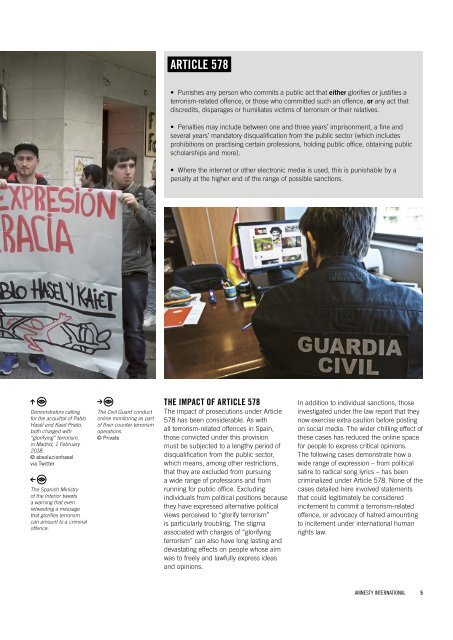Tweet...If You Dare
Create successful ePaper yourself
Turn your PDF publications into a flip-book with our unique Google optimized e-Paper software.
ARTICLE 578<br />
• Punishes any person who commits a public act that either glorifies or justifies a<br />
terrorism-related offence, or those who committed such an offence, or any act that<br />
discredits, disparages or humiliates victims of terrorism or their relatives.<br />
• Penalties may include between one and three years’ imprisonment, a fine and<br />
several years’ mandatory disqualification from the public sector (which includes<br />
prohibitions on practising certain professions, holding public office, obtaining public<br />
scholarships and more).<br />
• Where the internet or other electronic media is used, this is punishable by a<br />
penalty at the higher end of the range of possible sanctions.<br />
Demonstrators calling<br />
for the acquittal of Pablo<br />
Hasél and Kaiet Prieto,<br />
both charged with<br />
“glorifying” terrorism,<br />
in Madrid, 1 February<br />
2018.<br />
© absolucionhasel<br />
via Twitter<br />
The Spanish Ministry<br />
of the Interior tweets<br />
a warning that even<br />
retweeting a message<br />
that glorifies terrorism<br />
can amount to a criminal<br />
offence.<br />
The Civil Guard conduct<br />
online monitoring as part<br />
of their counter-terrorism<br />
operations.<br />
© Private<br />
THE IMPACT OF ARTICLE 578<br />
The impact of prosecutions under Article<br />
578 has been considerable. As with<br />
all terrorism-related offences in Spain,<br />
those convicted under this provision<br />
must be subjected to a lengthy period of<br />
disqualification from the public sector,<br />
which means, among other restrictions,<br />
that they are excluded from pursuing<br />
a wide range of professions and from<br />
running for public office. Excluding<br />
individuals from political positions because<br />
they have expressed alternative political<br />
views perceived to “glorify terrorism”<br />
is particularly troubling. The stigma<br />
associated with charges of “glorifying<br />
terrorism” can also have long lasting and<br />
devastating effects on people whose aim<br />
was to freely and lawfully express ideas<br />
and opinions.<br />
In addition to individual sanctions, those<br />
investigated under the law report that they<br />
now exercise extra caution before posting<br />
on social media. The wider chilling effect of<br />
these cases has reduced the online space<br />
for people to express critical opinions.<br />
The following cases demonstrate how a<br />
wide range of expression – from political<br />
satire to radical song lyrics – has been<br />
criminalized under Article 578. None of the<br />
cases detailed here involved statements<br />
that could legitimately be considered<br />
incitement to commit a terrorism-related<br />
offence, or advocacy of hatred amounting<br />
to incitement under international human<br />
rights law.<br />
AMNESTY INTERNATIONAL 5


